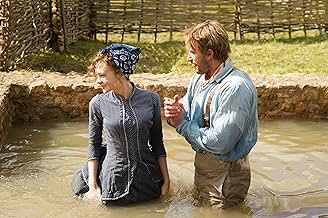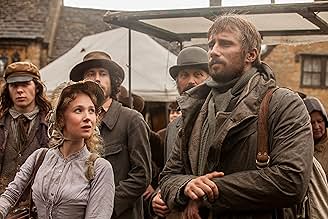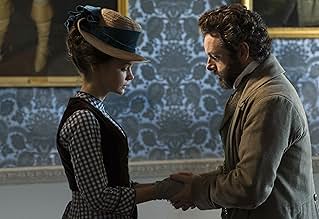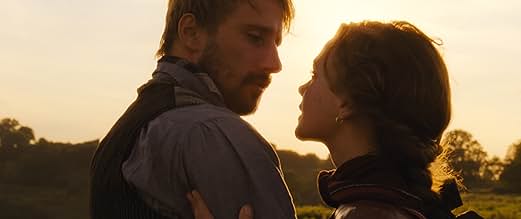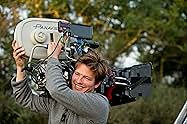In Victorian England, the independent and headstrong Bathsheba Everdene attracts three very different suitors: Gabriel Oak, a sheep farmer; Frank Troy, a reckless Sergeant; and William Boldw... Read allIn Victorian England, the independent and headstrong Bathsheba Everdene attracts three very different suitors: Gabriel Oak, a sheep farmer; Frank Troy, a reckless Sergeant; and William Boldwood, a prosperous and mature bachelor.In Victorian England, the independent and headstrong Bathsheba Everdene attracts three very different suitors: Gabriel Oak, a sheep farmer; Frank Troy, a reckless Sergeant; and William Boldwood, a prosperous and mature bachelor.
- Director
- Writers
- Stars
- Awards
- 2 wins & 11 nominations total
- Director
- Writers
- All cast & crew
- Production, box office & more at IMDbPro
Featured reviews
Carey Mulligan plays Ms. Everdene, and she is exceedingly independent and ambitious for the time period, while simultaneously being attractive in a more timeless manner. This rare combination results in three quite different suitors. She first meets sheep farmer Gabriel Oak (Matthias Schoenaerts, Rust and Bone), who is smitten with her spunk, and he proposes by offering her way out of poverty. She declines and the next time they cross paths, the tables have turned as she has inherited a farm and he has lost everything due to an untrained sheep dog. Next up is a proposal from a socially awkward, but highly successful neighborhood farmer. Michael Sheen plays William Boldwood, who is clueless in his courting skills, but understands that combining their farms would be a make-sense partnership. The third gent is Sergeant Francis Troy (Tom Sturridge), a master of seduction by sword. She is sucked in by Troy's element of danger, unaware of his recent wedding gone awry to local gal Fanny Robbin (Juno Temple).
As with most literary classics and in fact, most books the screen adaptation loses the detail and character development that make the book version so enjoyable. Still, we understand the essence of the main characters, and the actors each bring their own flavor to these roles. The story has always been first and foremost a study in persistence, and now director Vinterberg and Mulligan explore the modern day challenges faced by women in selecting a mate: slow and steady, financially set, or exciting and on edge. In simpler language, should she follow her head, wallet or heart?
In a time ruled and defined exclusively by men, Bathsheba Everdene (Carey Mulligan) stands apart as a free-spirited, independent young lass who refuses to bow to convention. When she inherits the farm belonging to her late uncle, she insists on running it herself - working in the fields and sacking the male workers who disrespect her authority. Small wonder, then, that Bathsheba draws the attention of three suitors, each one representing a different social class and a unique brand of manhood: stoic farmer Gabriel Oak (Matthias Schoenaerts); stern, serious-minded landowner William Boldwood (Michael Sheen); and sexy, emotionally scarred sergeant Francis Troy (Tom Sturridge).
The main problem with Hardy's novel, which is largely replicated in Vinterberg's faithful adaptation, is its awkward attitude towards its lead female character. To be sure, Hardy gives Bathsheba a modern voice that still rings true today: "It is difficult for a woman to define her feelings in a language chiefly made by men to express theirs," she declares. It's a line so delicious that screenwriter David Nicholls nicked it wholesale for the film. And yet, on a deeper reading of the novel, it becomes far harder to tell whether Hardy is celebrating Bathsheba's independence, or punishing her for it.
To their credit, Vinterberg and Nicholls do try a little harder to add a truly feminist bent to their version of Bathsheba's story. More care is taken to forge a genuine emotional connection between Bathsheba and Gabriel, even as her seduction of William Boldwood is made less purposeful. Bathsheba still finds herself approaching Sergeant Troy with lust rather than caution, but she does so in a more clear-eyed manner. In effect, Mulligan's Bathsheba seems bemused at and somewhat resigned to the sillier decisions she makes in her romantic pursuits.
The trouble is that, while these little changes do add up to a stronger character, they also result in thematic and tonal confusion. The truth of the matter is that Hardy was not always concerned with celebrating Bathsheba as a character in her own right - he was frequently more interested in commenting on the ideal romantic suitor, the kind of man to whom Bathsheba should give her heart. There's never any doubt, in Hardy's mind at least, what her choice should be. After a point, then, Vinterberg's film flounders because there is, truthfully, no real tension in the romantic dilemma that stares Bathsheba in the face.
It's a shame, because Vinterberg has brought Hardy's world to life with a very good cast indeed. Mulligan plays the fire and spirit of Bathsheba well, although she's trapped as much by the script as her character is by Hardy's words and ideas in the novel. As the sturdy Gabriel Oak (his surname says it all), Schoenaerts turns a rather dull but handy lump of a man into a semi-credible romantic prospect. The ever-reliable Sheen doesn't have quite enough screen-time, but nevertheless packs a great deal of depth and despair into the loss of William Boldwood's heart (and, perhaps, mind) to the charms of Ms. Everdene. There's almost more to be enjoyed in the semi-confessional scene shared by these two very different men as they sheepishly dance around their feelings for the same woman. Sturridge, meanwhile, is the relatively weaker link in the cast; his performance is fuelled more by his sexy moustache and saucy swordmanship than anything else.
At a point in time when female-led films are being discussed, dissected and celebrated more than ever before, Far From The Madding Crowd would - at least on the surface - appear to be part of this growing tradition. The filmmakers have certainly tried to create a version of Bathsheba Everdene that's unequivocally appealing to a modern audience. But it's an effort that, ultimately, doesn't quite work, since the point of Hardy's novel was arguably more about the man Bathsheba should marry, and less about Bathsheba herself.
Vinterberg has set himself a difficult task. Schlesinger's film was a landmark of British cinema, marking the beginning of what I have come to think of the "heritage cinema" style of film-making. In my eyes at least, and I suspect in the eyes of many others, it has become the definitive version; I cannot re-read the novel- it is a favourite of mine and I have read it several times- without picturing Bathsheba as Julie Christie, Gabriel as Alan Bates, Troy as Terence Stamp or Boldwood as Peter Finch.
Like Schlesinger, Vinterberg sticks fairly closely to Hardy's story, although of necessity some minor episodes have had to be omitted. There were one or two touches I didn't really care for, such as the scene where Troy grabs Bathsheba by the crotch. In the novel Hardy describes Troy's seduction of the young woman with great delicacy. This is not just a question of Victorian prudery, but also of psychological realism. A girl as independent and determined as Bathsheba would have resented such a crude approach; had Troy attempted it he would doubtless have got his face slapped for his pains. I also felt that this version rather inflated the social status of both Bathsheba and Boldwood. In the novel both are prosperous farmers, but nothing more. Here they live in the sort of style which would suggest she is the Lady of the Manor and he a wealthy aristocrat.
Hardy's novel is, among other things, a celebration of the English countryside, and this aspect is brought out well here. Like Schlesinger's, the film is visually attractive with some striking photography of the rural landscapes, often seen bathed in a soft, golden glow. On the acting side I was most impressed by Matthias Schoenaerts as Gabriel. His interpretation is rather different from Bates's, making his character perhaps more genteel and less rough-hewn, but still a man of great sensitivity and integrity. The Belgian-born Schoenaerts speaks flawless English with no hint of a foreign inflection, although it is noticeable that, unlike Bates, he does not attempt a West Country accent. Possibly wisely- English regional accents can be notoriously difficult for foreign-born actors.
On the other hand, I was less impressed by Tom Sturridge who makes an unmemorable Troy, lacking the roguishness and devil-may-care charm which Stamp brought to the role. Michael Sheen is better as Boldwood, but never quite matches Finch's desperate, nervous intensity. The difference, perhaps, is that Sheen's Boldwood is obsessed by Bathsheba whereas Finch's is almost literally possessed by her. Carey Mulligan has plenty of experience in films of this type, having inherited the crown formerly worn by Helena Bonham-Carter and Keira Knightley, that of Reigning Queen of Period Drama. She has been praised for her performance here, but personally I preferred Christie's rather more imperious and headstrong interpretation. Vinterberg's film is a generally solid, well- made piece of period drama, but for me it will not replace Schlesinger's as the definitive version. 7/10
I think the scene when Fanny got the wrong church was disappointing as well. There was no sense of the mad dash she had across town to find the right church and only to find Frank striding out full of indignation at being stood up and telling her "It's too late!" The beautiful words of Gabriel to Bathsheba "when I look up there ye will be and when you look up there I will be" just don't feature at all.
The "shooting at the end was tame to say the least & Martin Sheen was much less forceful in his insistence of marrying Bathsheba But I did like Carey Mulligan as Bathdheba. What was missing was the energy & drama the original film had and dare I say it some Wessex accents....
Did you know
- TriviaAsked who she would have chosen if she had these three very different suitors in real life, Carey Mulligan chuckled as she quickly replied, "I probably would have gone for the guy with the baby lamb (Gabriel) in the first 20 minutes of the film."
- GoofsIn the final scene when Gabriel leaves the farm he is wearing white trousers and white shirt with a dark waistcoat but shortly later when B catches up with him he is dressed in completely different clothes.
- Quotes
Bathsheba Everdene: It is difficult for a woman to define her feelings in a language chiefly made by men to express theirs.
Details
- Release date
- Countries of origin
- Official site
- Language
- Also known as
- Lejos del mundanal ruido
- Filming locations
- Mapperton, Beaminster, Dorset, England, UK(Bathsheba Everdene's farm)
- Production companies
- See more company credits at IMDbPro
Box office
- Budget
- £12,000,000 (estimated)
- Gross US & Canada
- $12,236,500
- Opening weekend US & Canada
- $164,985
- May 3, 2015
- Gross worldwide
- $30,599,369
- Runtime1 hour 59 minutes
- Color
- Sound mix
- Aspect ratio
- 2.35 : 1
Contribute to this page








